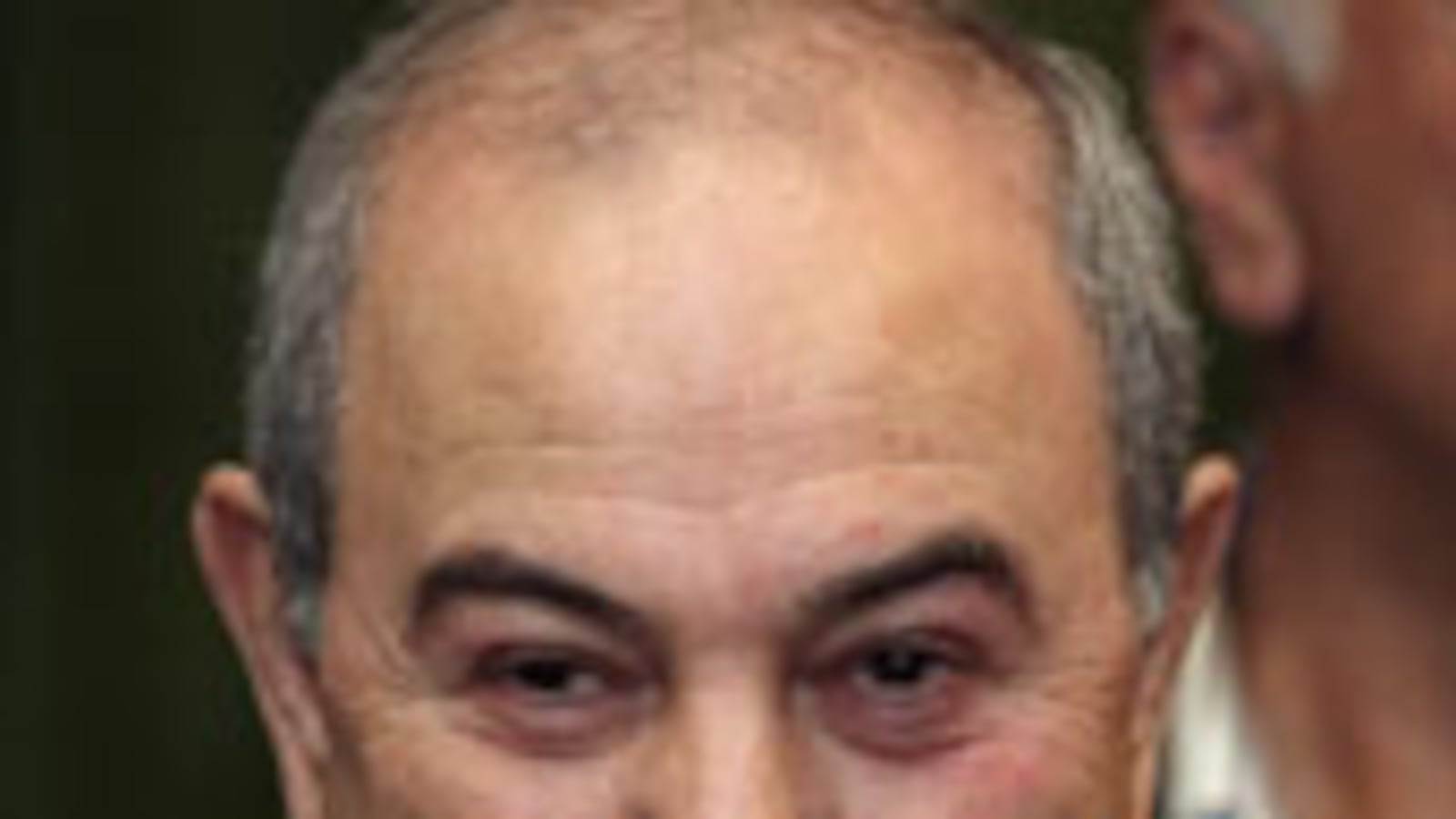
After narrowly winning Iraq’s elections, Ayad Allawi now faces a new political minefield: a prime minister who doesn’t want to leave, a secretive government panel bent on his destruction, a long and messy government formation process where he’ll have to fight to keep his own alliance together, and the tall task of convincing both Kurds and religious Shiites that the former Baathist can be their leader, too. He’s got 91 seats, while his closest rival, Prime Minister Nouri Al Maliki, has 89. In Iraq’s 325 seat parliament, the magic number to form a government is 163. So what are Allawi’s next moves?
The longer Maliki can stay in office and make use of all the governmental resources and power at his disposal, the better his chances are of beating back Allawi.
1) Get All the Shiites Together: Western officials believe that for Allawi to get the top job, he needs to get all the members of the Iraqi National Alliance, which won 70 seats, on his side. The INA is a Shiite Islamist political bloc, made up primarily of Moqtada Al-Sadr’s Sadrist Trend and members of the Islamic Supreme Council of Iraq (ISCI). Even before the final tally was announced, sources inside his party told The Daily Beast that they’d been reaching out to get the Sadrists to join with them. But the Sadrists alone won’t be enough, according to Western officials in Baghdad. Allawi needs to bring ISCI along as well, which will be a much harder sell: Shiite cleric Ammar Al-Hakim's party is backed by Tehran. They still harbors suspicions of Allawi’s Baathist past, as well as his secular leanings.
• Bruce Riedel: Who’s Winning Afghanistan?2) Romance the Kurds: The fact that Allawi’s bloc won on its reputation as Arab nationalists makes the Kurds very suspicious. A portion of the Kurdish slate, however, will likely be needed to put Allawi over the top. Here Allawi has to walk a fine line: easing the valid Kurdish paranoia over Arab designs on Kirkuk while keeping the popular Arab nationalist members on his own bloc happy. In particular, the Kurds have issue with Osama al Nujaifi, a key figure and vote getter from northern Ninewa province in Allawi’s coalition. So far, though, Nujaifi is saying the right things. “We will contact all [parties], and in the coming few days, I think I will go to Kurdistan to start talking to the Kurdish leaders to get their views on forming the government,” he told reporters over the weekend.
3) Get Maliki to Make Way: Iraqi politics is about personalities, not democratic institutions. Legal mechanisms and constitutional niceties have a way of bending towards whomever can best manipulate the reigns of power. Often the process is opaque, biased, and most certainly hardball. To become prime minister, Allawi will have to figure out how to push aside the incumbent, Nouri al Maliki.
Maliki has already started to use any (so, far non-violent) means necessary to keep his regime intact. (Although, as the L.A. Times reports, there is a worry of political assassinations in the coming weeks.) Maliki immediately called for a recount, and the shadowy Truth and Accountability Commission—run by Ahmed Chalabi and supported by Maliki, which banned a number of Allawi’s candidates in the weeks before the vote—says there are at least 50 more candidates who are going to get axed. At least one of those is reportedly on Allawi’s list; a couple more and he’ll lose his slim plurality. According to Rod Nordland at the New York Times, Maliki has already made sure Iraq’s Supreme Court has his back, as the court issued a favorable ruling on Friday which looked designed to help Maliki get the edge in THE months ahead. U.S. officials think that Maliki will drop his demands for a recount after his claims of voter irregularities are investigated. But the longer Maliki can stay in office and make use of all the governmental resources and power at his disposal, keeping the political atmosphere uncertain, the better his chances are of beating back Allawi.
The spin from Maliki’s camp is that a majority of the parties are willing to accept Maliki as prime minister. “All talks we did, so far, are positive and no one, including the INA, showed any opposition on nominating Maliki again for the new government,” State of Law member Khalid Al Assadi told The Daily Beast.
4) Raid Maliki’s List: To protect himself against Maliki, Allawi must try to pick off Sunni and other members on Maliki’s slate. On Sunday he announced he would do just that, saying that he was open to “holding talks with the State of Law list…because we think that Iraq is not a property of a certain group rather it is for all.”
5) Keep the Message (Relatively) Positive: Besides his strongman appeal, Allawi’s secular message resonated with voters. Though a Shiite himself, he’s still seen as a representative of the Sunni Arab minority and political lines in Baghdad are again breaking down by sect. To reverse this trend, he’ll need to convince both Shiites and Kurds he’s willing to share power, make concessions, and give them real roles in the government. He’ll also have to make sure members of his party stay on message and don’t say things that could upset the delicate negotiations and needlessly offend potential allies. (As Tareq Al-Hashemi did before the election, when he said that an Arab should be president of Iraq, not a Kurd.) As Salih al Mutlaq, a key leader of Allawi’s who himself was banned from running, put it: “Our strategy will be based on the principal of ‘Let bygones be bygones.’ We will be open to other lists.”
Michael Hastings is a regular contributor to GQ and the author of I Lost My Love in Baghdad: A Modern War Story. He is currently on assignment in Iraq.





